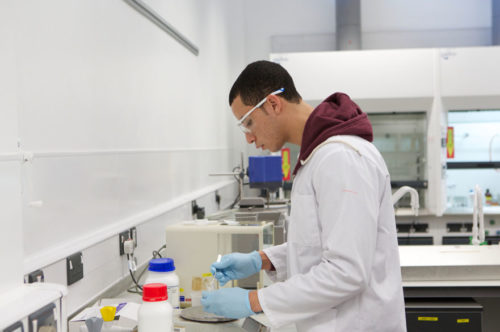This extended degree in chemical engineering gives you the knowledge and skills for a successful career as a professional engineer. It covers growth areas in the discipline, including engineering science, particle technology, pharmaceutical development and bioengineering.
As the course includes an extra year that will prepare you for learning at degree level, we ask for lower entry points than for our standard BEng.
Popular career choices for our chemical engineering graduates include roles in the chemical and process engineering, pharmaceutical, and food and beverage industries.
What you will study
Students are required to study the following compulsory modules.
- Engineering Project Design and Implementation (60 credits)
- Professional and Personal Development (30 credits)
- Introduction to Engineering Mathematics (30 credits)
Year 1
Students are required to study the following compulsory modules.
- Fundamentals of Chemical Engineering (15 credits)
- Design and Materials (30 credits)
- Engineering Professional Skills 1 (30 credits)
- Engineering Principles (15 credits)
- Engineering Mathematics 1 (30 credits)
Year 2
Students are required to study the following compulsory modules.
- Fluids, Heat & Mass Transfer Processes 1 (15 credits)
- Reactor Engineering (15 credits)
- Chemistry for Chemical Engineers (15 credits)
- Separation Processes 1 (15 credits)
- Process Measurement & Control (15 credits)
- Engineering Professional Skills 2 (15 credits)
- Engineering Mathematics 2 (15 credits)
- Thermodynamics (15 credits)
Year 3
Students are required to study the following compulsory modules.
- Fluids, Heat & Mass Transfer Processes 2 (15 credits)
- Chemical Plant Design & Material Handling (15 credits)
- Individual Design Project (30 credits)
- Process Safety (15 credits)
- Separation Processes 2 (15 credits)
- Engineering Professional Practice (15 credits)
Students are required to choose 15 credits from this list of options.
- Environmental Engineering and Sustainability (15 credits)
- Water Engineering (15 credits)
- Bulk Solids Handling (15 credits)
- Quality Engineering (15 credits)
How you will learn
This section helps you understand more about how you’ll learn based on standard delivery of teaching and learning on campus.
We are looking forward to welcoming students to our campuses for 2021/22. In line with government guidance, we are committed to delivering as much of our teaching, learning and student activity as possible on campus for the 2021/22 academic year. Depending on the national situation, and government advice, the situation may change but we are confident we are ready to manage any changes quickly and safely.
Careers and placements
Will I have a work placement?
Students go to a range of companies and organisations of varying sizes for their placements, including large multi-national firms, government agencies, the NHS and small to medium sized companies engaged in research, analytical services and manufacturing.
- Previous students have worked in: Eon, Dyson, ADEY, PS Analytical and E-liquids, GSK, NHS hospitals.
- IAESTE (British Council) placements to Brazil, Dubai and Poland.
- We have a dedicated team to search for and inform students about relevant opportunities and help students prepare for interviews.
How long is my placement?
Students can undertake a summer placement for between 6 weeks to a maximum of 3 months, which is acknowledged by the award of a Certificate of Industrial Experience. Students are also encouraged to apply for sandwich placements lasting between 9-12 months which sit between the second and third year of the degree.
What are the financial arrangements?
The Faculty expectation is that students are as far as possible treated like other employees of the company or organisation. It is expected that students on sandwich placements will be paid throughout their time with the company. In some cases, students on summer placements have had expenses only covered by the company. Students on sandwich placements are required to pay a reduced fee to the University for their placement year.
Zobacz więcej na stronie uniwersytetu >>
Wiza studencka do Wielkiej Brytanii
Aby studiować w Wielkiej Brytanii potrzebujesz wizy studenckiej. Aby złożyć wniosek o taką wizę studencką musisz zdjać certyfikat językowy na poziomie B2.
Uważaj! Do celów wizowych musisz wybrać wyłącznie egzamin w wesji Secure English Language Test (SELT) UKVI .
Co to jest test SELT UK VI registration? Przeczytaj więcej o testach SELT UKVI >>




















